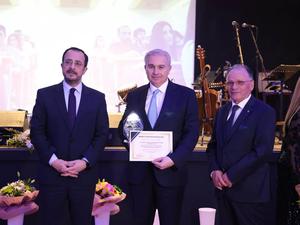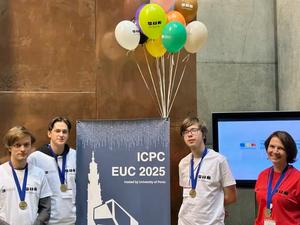Information
The Programme in Architecture offers a Bachelor’s Degree after four years of full-time studies (240 ECTS) and the Integrated Master in Architecture after five years of full-time studies (300 ECTS).
The Programme in Architecture acknowledges the significant social role and responsibility of architectural practice for the study and development of space, both public and private. In this respect, each student is considered as a distinct personality, freely open to a system of values and abilities, concerning their aesthetic development, imagination, intuition, ethos and consistency. At the same time it provokes and activates students’ involvement and continuous participation in a reflective process that transforms their thinking, and incorporates a critical approach in their creative evolution. Furthermore, it explores and utilises the heterogeneity of its highly qualified teaching faculty, as an educational tool, in order to formulate and establish a wide field of multiple approaches to architecture. Through systematic research in all aspects of architecture, and within the overall framework of university education, it combines the broader humanistic values, with the development of the necessary theoretical and technical skills for the professional life of its students.
Methodologically, the Programme explores architectural design by systematically promoting a teaching system, adaptable to the characteristics and interests of each individual student. This essentially experimental process equipes students with both a unique comprehension of architecture, as well as the necessary means and skills of personal expression both during their studies, and upon their graduation.
Far from being a static system, the Programme in Architecture, is a dynamic framework, open to the internationally developing architectural dialogue. By addressing both the local and global substance of Architecture, it aspires to act as an intellectual and cultural hub for the city of Pafos, building on the one hand on its own organization and activities, as well as by developing strong synergies with the city, its people and its institutions. At the same time, it gradually, but systematically, establishes connections with its wider context in Cyprus, the Mediterranean, and globally, through student and teacher exchanges, research programmes, exhibitions, workshops and conferences, but also through the thematics of its courses.
CAREER PROSPECTS
The Bachelor and Integrated Master in Architecture fulfil the academic and professional requirements set by, a) The EU Directive 85/384/EC for architects and the new Directive 2005/36/EC about the recognition of the Professional Qualifications (which is a law of the EU and binds its members since 2007). b) The recommendations of UIA (Union International of Architects) about the skills architects must have to practice as architects. c) The local market of Cyprus and the conditions of accession to the profession as they are indicated by the Technical Chamber of Cyprus.
Based on the above referred institutional regulations, the Programme offers a Bachelor of Architecture after four years of study, and an Integrated Master in Architecture, after an additional year of study. The Bachelor of Architecture degree does not lead to professional accreditation. To get that, students need to complete an Integrated Master in Architecture degree, after one more year of studies in order to become eligible for professional accreditation.
Upon completion of the 5-year programme, graduates of Architecture must acquire a minimum one year of professional practice and fulfil the requirements set by the Cyprus Technical Chamber in order to become registered architects in Cyprus with full professional accreditation.
Program
SEMESTER 1
- ARCHITECTURE STUDIO 1: The fundamentals of architecture: Elements and Forms.
- TECHNICAL REPORTS (Common with Civil Engineering)
- BUILDING TECHNOLOGY 1: Structural Systems I
- SEMINAR: Space-Communication-Architecture
- SPATIAL VISUALIZATION 1: Architectural/Technical Drawing, (Common with Civil Engineering)
- SPATIAL VISUALIZATION 2: Free-hand Drawing
SEMESTER 2
- ARCHITECTURE STUDIO 2: The fundamentals of architecture: Elements and Forms
- HISTORY 2: History of Architecture and Art (Antiquity)
- BUILDING TECHNOLOGY 2: Construction Components, Marterials and Methods of Constructions
- BUILDING TECHNOLOGY 3: Structural Systems II
- SPATIAL VISUALIZATION 4: Advanced Drawing Techniques and Modelmaking
- Computer Aided Design
SEMESTER 3
- ARCHITECTURE STUDIO 3
- BUILDING TECHNOLOGY 5: Reiforced Concrete Structures
- TECHNOLOGY STUDIO 1: Construction Systems
- BUILDING TECHNOLOGY 4: Building Services
- SPATIAL VISUALIZATION 7: Digital Design
- HISTORY 2: History of Architecture and Art (2nd-18th c.)
SEMESTER 4
- ARCHITECTURE STUDIO 4: Urban Design
- ARCHITECTURE STUDIO 5
- HISTORY 3: History of Architecture and Art (19th-20th c.)
- BUILDING TECHNOLOGY 6: Building Physics
- Digital Design
SEMESTER 5
- ARCHITECTURE STUDIO 6: Restoration and Reuse of Historic Buildings
- THEORY 2: Theory of Conservation - Restoration
- SEMINAR 1: Object and Space
- TECHNOLOGY STUDIO 2: Lightweight Structures (metal and wood)
- Principles of Real Estate: (Taught by Real Estate)
SEMESTER 6
- ARCHITECTURE STUDIO 7: Sustainable Architecture
- THEORY 2: Theory of Bioclimatic Design and Sustainability
- ARCHITECTURE STUDIO 8: Landscape Architecture
- SPATIL VISUALIZATION 6: Photography-Cinema-Set Design
- Real Estate Evaluation (Taught by Real Estate)
SEMESTER 7
- ARCHITECTURE STUDIO 9
- ARCHITECTURE STUDIO 10: Urban Planning
- SEMINAR 3: Urban Planning and Sustainable Development
- SEMINAR 3: Open Urban Spaces and Place-making (Elective)
- TECHNOLOGY STUDIO 3: Advanced Structural Systems
SEMESTER 8
- ARCHITECTURE STUDIO 11
- Dissertation
- SEMINAR 4: Research Methods for Architecture
- THEORY 3: Architecture and Place
- SEMINAR 4: Aspects of Spatial Language
SEMESTER 9
- ARCHITECTURE STUDIO 12: Introduction to Design Thesis Studio
- SEMINAR 5: The Morphology of Theatrical Space
- SEMINAR 6: Space and the Architecture of Time
- PLACEMENT or Open Elective from other Schools or ARCH EE509(Space and the Architecture of the Void) (Elective)
- THEORY 4: Theory of Architecture
- SEMINAR 7: Professional Practice
SEMESTER 10
- Diploma Design Thesis
- SEMINAR 7: Architectural Design Seminar
- SEMINAR 9: Space and the Architecture of the Void
News

Neapolis University Pafos Awarded for Higher …

Neapolis University Pafos Establishes Jean Monnet …

Neapolis University Pafos and TechIsland renew …







